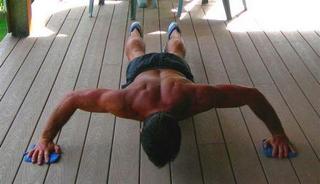Qualities Of A Fitness Professional: What Makes A Great Personal Trainer and How To Spot An Unqualified One!
By Kyle Battis CSCS, L/ATC, NSCA-CPT
www.ProFitnessCoaching.comPersonal Trainers Are Everywhere
In today’s day and age there are more health clubs and more personal trainers than ever. In fact, according to Personal Fitness Professional magazine, "An estimated 5 million Americans are using personal trainers." A growing army of fitness professionals has emerged to act as mentors trained to assist you in your quest for improved health and fitness. It is essential to differentiate between a qualified fitness professional and your average personal trainer as the former can deliver impressive results and the latter can potentially cause personal injury or even death!
Personal Trainers Should Be Mentors
Men such as Louis Durlacher and Eugen Sandow were the pioneers of personal training. As stated by the late Dr. Mel Siff, "At the time, the training of royalty, the wealthy and the famous with weights and specialized exercises was a well-established and desirable profession, predating the current generation of so-called personal trainers by about 150 years." Personal training is now a growing profession as more people are realizing the benefits of regular physical activity and are seeking ‘expert’ advice from fit mentors.
A mentor is someone who can help you achieve a given task in a more efficient and streamlined manner. Personal trainers should be mentors that specialize in helping people achieve new levels of positive physical change but buyer-beware! Not all personal trainers are qualified to deliver the results that they promise. A qualified personal trainer can develop a safe and effective exercise program but an unqualified trainer can get you killed!
Buyer Beware!
Stephan Grisanti, author of Industry of Illusions, cites a report by CBS News correspondent Wyatt Andrews that tells a frightening story of one woman’s experience with a so-called personal trainer. Andrews reported on one of these unqualified personal trainers and the fatal harm that this trainer caused to Anne Capati. "The trainer, who knew Capati had high blood pressure, also suggested, in writing, diet supplements including Thermodrene, which contains the stimulant Ephedra. The family charges the stimulants and the trainer’s poor judgment led to Capati’s death. The Capati lawsuit has helped expose two health club secrets. The first is sometimes a certified personal trainer isn’t certified. The second is there is no standard—national, state or otherwise—for what the word certified means." This scenario has happened repeatedly in years past and it saddens me as I read about people suffering injuries or death by the hands of unqualified personal trainers that have no business providing advice to other people. It is essential that you become an educated consumer and protect yourself with knowledge.
The Process Of Selecting a Qualified Personal Trainer/Fitness Professional
You have decided to get into shape and you are seeking a mentor to help you achieve your fitness goals, now what? You have realized that some expert guidance will help you achieve results in a more efficient manner and you have decided to hire a personal trainer. This is where you should take care in selecting the individual that will be giving you advice that will affect your health and well-being. Follow this step-by-step list and you should be able to select a qualified personal trainer that will help you achieve your fitness goals.
1. Are You Ready To Start?
The first step is to determine if you are ready and able to start an exercise program. It is wise to consult your doctor and determine if you are ready to start and individualized exercise program. Depending upon your health and past medical history, your doctor may give some specific instructions on exercises or activities to avoid. This step is important especially if you are recovering from an illness or orthopedic injury. A good personal trainer will require that you complete a health and exercise history questionnaire at the very least prior to beginning an exercise program.
2. You’re Certified, So What!
Most people realize that they should ask if their potential personal trainer is certified or not. If the trainer says they are not certified, simply walk away. If a personal trainer tells you that they are certified you should then ask them what organization certified them. Being certified is certainly a good start but the problem is that there are currently over 300 different personal training certifying agencies in existence according to Phil Kaplan, author of Personal Training Profits. Some of these certifications have lofty standards while others only require that you watch a video and mail in the answers to a written test in order to become certified. The quality of the certification really depends upon which agency is doing the certifying, what the certification requirements are, and what the trainer gains from that particular certification. There are a handful of certifications that have value and a lot of them that are not worth the paper they are printed on so do your homework.
The National Strength and Conditioning Association (NSCA) and the American College Of Sports Medicine (ACSM) are two of the most respected certifications in the fitness industry. The NSCA is the only nationally recognized accredited certification and it offers both a Certified Personal Trainer (NSCA-CPT) and Certified Strength and Conditioning Coach (CSCS) credential. The ACSM is considered the "Gold Standard" in the fitness industry and is also highly respected by the medical community. Both of these organizations involve a practical and written examination along with continuing education requirements.
To determine the value of their certification, ask them what kind of requirements they needed to fulfill in order to achieve that credential. Ask about continuing education requirements and if they have to stay abreast of new research in order to maintain their certification. Do some research about the personal trainer’s certification and try to determine its value, if any.
3. Do You Have Education In Exercise Science?
Ask them if they have a college degree in a health or fitness related field. In the NSCA’s publication entitled: How to Select a Personal Trainer, the authors state: "Personal trainers with an educational background in Exercise Physiology, Sports Medicine, Health and Wellness, Physical Education, or Anatomy and Physiology have a more thorough understanding of the way the different systems within the body work together, and how exercise affects each of these systems." I have met many great personal trainers who did not get an education in exercise science but other qualities made them true professionals. It is important to realize that no one criteria can qualify a personal trainer and that it is important to evaluate a personal trainer by looking at everything that they bring to the table. As a general rule though, a true fitness professional will seek out a college education in a health related field and will have a more in-depth understanding about how to help you achieve positive physical change.
4. Do You Have The Qualities Of A Fitness Professional?
Certification and college education are not enough to make a qualified personal trainer. I have met certified personal trainers with a degree in exercise science that had a great knowledge base but could not convey that knowledge to their clients making them very ineffective trainers. Below is a checklist of qualities compiled from experts in the industry that can help you select a qualified fitness professional. It would be wise to set up consultation session with the trainer that you are considering retaining and looking these qualities throughout the meeting:
- They must be certified in CPR (Cardio Pulmonary Resuscitation) and First Aid at the very least
- Must posses excellent people skills and be able to communicate effectively
- They should be great motivators and understand the process of change
- They should act and look professional at all times
- You should be able to work with this trainer and there should be some compatibility between you and the trainer
- They should act as a role model in mind, body, and action (Do they walk the walk or just talk the talk?)
- They should be able to help people achieve the results that they expect
- They must have an in-depth knowledge of exercise technique and exercise theory
- They must have adequate knowledge of human physiology and nutrition
- If you are training for a specific reason (i.e. improved sports performance) the trainer should have relevant education, experience, and possibly certification
- They must be responsible and dependable
- They should have concern for the health and well-being for each and every client that they work with
- They should be loyal and have a high level of integrity
- They should be able to market their services effectively
- They should always keep learning and stay on top of current trends
- They should be teachers who aim to educate, develop independence, and empower their clients
They should have a strong relationship with other medical/health professionals such as: Medical Doctors, Cardiologists, Registered Dieticians, Physical Therapists, Occupational Therapists, Massage Therapists, Athletic Trainers, Chiropractors, Orthopedic Doctors, other Personal Trainers, and Exercise Physiologists.
- They should know when to refer out to other medical professionals when clients require services that are not within the trainer’s "scope of practice". This basically means that the trainer should not provide advice that they are not trained to give!
- They should be members in professional organizations such as the NSCA, ACSM, IDEA, ACE, AFAA, ISSA, SWIS, etc.
- They should initially perform a full compliment of fitness tests including such things as movement screens, VO2 max or sub-max testing, flexibility assessment, strength testing, endurance testing, body fat testing, girth measurements, before and after photographs, all depending upon your individual goals. The trainer should regularly re-test to monitor progress.
- Finally, as Dr. Mel Siff stated in his book Facts And Fallacies Of Fitness, "Your entire approach may be summarized in the form of three commandments: 1. Enhance the Quality Of Life of your client, 2. Act as if you are a Concerned Parent training a valued child, 3. Apply Knowledge, Wisdom and Understanding."
Putting It All Together
You should now have a more complete idea of what to look for when hiring a personal trainer. You should look for a personal trainer, preferably one with a college education, who has at least one certification from a reputable organization (look below for a list of different organizations). Once you have found a trainer that you are considering hiring, set up a consultation session with the potential trainer and look for the qualities from the list that fitness professionals should posses.
People hire personal trainers for many different reasons and it is important to have a plan in mind of what you want to get out of your sessions. You most likely will not want (or be able to afford) a personal trainer forever so it is essential that you evaluate your budget and find a trainer that can help you achieve the results you expect in the most cost-effective manner. Some fitness professionals, for example, will set up their clients on individualized exercise routines for a number of weeks and then periodically have "tune-up sessions" where testing occurs, a new plan developed, and a new program is instituted. The personal trainer should be able to adjust to your needs and your individual goals. A qualified personal trainer should be able to empower you with knowledge and inspire you with results. They should help you achieve your fitness goals with an individualized plan and teach you how to utilize the tools of positive physical change to mold your body into the one that you have envisioned.
There are more personal trainers now than ever so be certain that the one that you entrust will help you achieve your goals in the safest and most effective manner possible. Good luck and enjoy the experience of working with a qualified personal trainer!
Sincerely,
Kyle Battis CSCS, ATC, NSCA-Certified Personal Trainer
Professional Fitness Coaching
www.ProFitnessCoching.comkyle@profitnesscoaching.com
Personal Trainer Locators and Certification Organizations:
IDEA Personal Trainer Locator:
http://www.ideafit.com/trainerlocator.aspAmerican College of Sports Medicine (ACSM):
http://www.acsm.org/index.aspNational Strength and Conditioning Association (NSCA):
http://www.nsca-lift.org/, NSCA-Certified Personal Trainer Referral Service: (1-800-815-6826).
International Sports Sciences Association (ISSA):
http://www.issaonline.com/American Fitness Professional and Associates (AFPA):
http://www.afpafitness.com/American Council on Exercise (ACE):
http://www.acefitness.org/National Academy of Sports Medicine (NASM):
http://www.nasm.org/Aerobics and Fitness Association of America (AFAA):
http://www.afaa.com/References
Grisanti, Stephen. Industry Of Illusions. Rivercast Publishing; 2002.
How to Select a Personal Trainer. National Strength and Conditioning Association. P.O. Box 9908, Colorado Springs, Colorado 80932-0908.
www.nsca-lift.orgKaplan, Phil. Personal Training Profits. Phil Kaplan’s Fitness Associates. 2000.
Siff, M.C. A Short History of Strength and Conditioning. Dolfzine Online Fitness. 4/5/2003. Pp. 4.
Siff, M.C. Facts and Fallacies of Fitness, 5th Edition. Mel C Siff. Denver, CO. 2002.
Swanson, Conrad. Personal Fitness Professional Newsletter. 1st Issue.
http://www.fitpro.com. 4/20/03.
Kyle Battis is a Certified Strength and Conditioning Specialist (CSCS) through the National Strength and Conditioning Association (NSCA), a Certified Athletic Trainer (ATC) through the National Athletic Trainer’s Association (NATA), a Certified Club Coach through United States Weightlifting (USAW), and an IDEA Professional Level Personal Trainer. Kyle specializes in athletic performance enhancement, injury rehabilitation, and physique-transformation programs. Receive a FREE "Result-Guaranteed! Workbook when you visit
www.ProFitnessCoaching.com! ($15 Value!).


